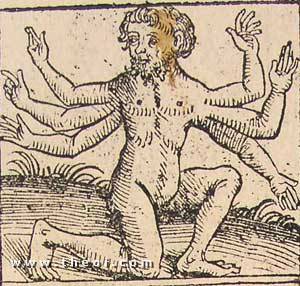GEGENEES
Greek Name
Γηγενης Γηγενεης
Transliteration
Gêgenês, Gêgeneês
Latin Spelling
Gegenes, Gegenees
Translation
Earth-Born (gêgenês)

THE GEGENEES were a tribe of six-armed giants who fought the Argonauts on Bear Mountain in Mysia.
PARENTS
GAIA (Apollonius Rhodius 1.901)
CLASSICAL LITERATURE QUOTES
Apollonius Rhodius, Argonautica (trans. Rieu) (Greek epic C3rd B.C.) :
"In the Propontis there is an island sloping steeply to the sea, close to the rich mainland of Phrygia, and
parted from it only by a low isthmus barely raised above the waves. The isthmus, with its two shores, lies east
of the River Aisepos (Aesepus); and the place itself is called Bear Mountain by the people round about. It is
inhabited by a fierce and lawless tribe of aborigines, who present an astounding spectacle to their neighbours.
Each of these earthborn monsters is equipped with six great arms, two springing from his shoulders, and four
below from his prodigious flanks. But the isthmus and the plain belong to the Doliones, who had for king the
noble Kyzikos (Cyzicus) . . . These people were never troubled by the fearsome aborigines: Poseidon, from whom
they were descended, saw to that.
Argo, pressing on with a stiff breeze from Thrake behind reached this coast and ran into a harbour called
Fairhaven . . . The Doliones and Kyzikos their king received the Argonauts in a friendly spirits . . .
In the morning some of the Argonauts climbed towards the top of Dindymon in the hope of seeing for themselves
the waters they would have to cross . . . Another party brought the ship from her former anchorage to the
harbour of Khytos (Chytus) [Kyzikos' city].
But now the earthborn savages, coming from the other side, dashed down the mountain and blocked the mouth of the
ample harbour of Khytos with boulders, in an attempt to pen them like wild beasts in a trap. However, Herakles
had been left there with the younger men. He quickly bent his recurved bow and brought a number of the monsters
down. The rest retaliated by pelting him with jagged rocks. And I cannot but surmise that these redoubtable
beasts were bred by Hera, wife of Zeus, as an extra labour for Herakles. But just at this moment, the rest of
the Argonauts, who had turned back before reaching the summit, appeared on the scene to take their part in the
slaughter. The monsters charged with fury more than once, but the young warriors were ready for them with their
spears and arrows and in the end they killed them all.
When the long timbers for a ship have been hewn by the woodman's axe they are laid in rows on a beach and there
they lie and soak till they are ready to receive the bolts. That is how these fallen monsters looked, stretched
out in a row on the grey beach by the harbour mouth. Some were sprawling in a mass with their limbs on shore and
their heads and breasts in the sea. Some lay the other way about; their heads were resting on the sands and
their feet were deep in the water. But in either case they were carrion for birds and fish. The day was won and
the Argonauts had no more to fear."
SOURCES
GREEK
- Apollonius Rhodius, The Argonautica - Greek Epic C3rd B.C.
BIBLIOGRAPHY
A complete bibliography of the translations quoted on this page.